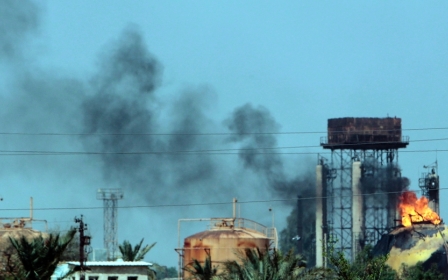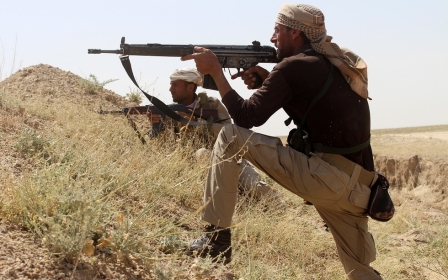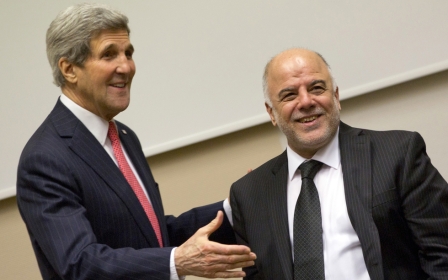Desperate Mosul residents flee to Kurdish-held Syria as doors shut

AL HAWL, Syria – More than 3,000 desperate Sunni refugees from northwestern Iraq have arrived at the al-Hawl refugee camp on the Syrian side of the border in the past week as the fight against the Islamic State (IS) in Iraq gathers pace.
Fresh advances were reported on Wednesday in the western Iraqi city of Rutba as the Iraqi military attempted to cut off IS's supply lines into Syria, the latest drive against the militant group.
But several hundred kilometres away in al-Hawl, the local Kurdish-led administration that runs the refugee camp finds itself conflicted about what to do. Fears are running high that IS sympathisers have crossed the border with refugees, while many families, women and children have also found themselves stranded and in dire need of aid and shelter.
The fresh exodus has been sparked by a wave of pro-Iraqi government advances that have pushed IS into further retreat and towards the Syrian border, where Sunni Arab civilians say they are happy to have escaped IS, but face an uncertain future.
“The Iraqi army said they would open 13 safety corridors for people running away from Mosul, but we did not see one corridor,” Abu Mutlak, an 18-year-old Iraqi who recently fled Mosul, told Middle East Eye.
“I come here to save the life of my kids,” said Abu Saraa, a 36-year-old Iraqi refugee who recently arrived in Syria. He spoke to MEE under a pseudonym for security reasons, as he used to work for the American energy company Baker Hughes Company in Basra.
“Daesh [IS] are ... killers and criminals. If you smoke, they kill you, if you wear anything [they don’t agree with] they kill you," he said.
“Whoever is Daesh – [forget about them] and kill them - but leave us innocent people alone. Even if there is one Daesh in the village, you claim the whole village is Daesh, this is not justice."
Many Iraqi civilians are now fleeing to the town of Makhmour, which is a half-hour drive from the frontline. The UN refugee agency (UNHCR) has built a new camp there, but many have complained that they were unable to gain access.
According to refugees in the Hawl camp, most of the roads north to Iraqi Kurdistan were blocked off, as were the roads south to Baghdad.
Nor has the road to Syria been left entirely open. Ciwan Sido, manager of Hawl camp said about 3,000 people arrived from Syria with the help of smugglers last week because IS also tries to stop them from leaving.
“We are helping now, but we have received no support from [international aid] organisations and everything - from protection, to food and water - is being provided by the local administration," Sido told Middle East Eye.
Now most of them want to go back to Iraq, but the Kurds controlling the Rabia border crossing are not allow them to return. As long as Iraq proves unwilling to take these people back, the numbers of refugees in the camp are expected to swell.
Iraqi authorities, both in Erbil and Baghdad, are currently demanding that people be sponsored by family or friends in Iraq in order to return, but this already difficult process is further complicated for those stranded in Syria. The recent wave of IS bombings in and around Baghdad that has killed more than 200 people is likely to exacerbate matters.
“Most people want to go back, but they need a sponsor on the other side,” Sido said.
While Sido says that Sunni Arabs continue to be welcome, he says that with so few resources at his commands, it will be extremely difficult to separate genuine refugees from IS supporters, which has further raised suspicions.
“For example, right now we have 3,000 people, and maybe 50 people are with IS, and will go to our cities and carry out suicide attacks,” he said.
There has already been two IS arrests, Sido said.
“Yes, after they entered, we got the names, and the Asayis [police] arrested [the IS suspects] after an investigation,” he said.
The vast majority of new arrivals are outraged. They say they were persecuted by IS, but are being treated like criminals by the Iraqi Kurds, as well as by pro-Baghdad factions in Iraq, which say they distrust Sunni Arabs after they seemingly welcomed IS when the militants captured Mosul in 2014.
“The difficulty is leaving," said Iraqi refugee Abu Saraa. "There is a problem between the [Iraqi] Kurds and the Arabs. The Kurds say that all the Arabs are ISIS [Islamic State] and this is another ... problem we need to solve."
Kurds split
The issue is not just a Kurd-Arab divide: The region’s Kurds have also found themselves split over what to do about the new arrivals.
Unlike the Iraqi Kurdistan government, which was recognised by the Iraqi constitution in 2005, the Syrian Kurdish administration rose up during the country’s civil war. As such, it is not recognised by either Damascus or the international community, which has made getting aid and supplies far more difficult.
The refusal of the main Syrian Kurdish faction, the Democratic Union Party (PYD), to ally more closely with the president of the Iraqi Kurdish region, Massoud Barzani, prompted Iraqi Kurdish authorities to close the Peshkhabour border crossing in March. The crossing is one of the few between the Syrian Kurdish administration and Iraq, and was a key lifeline for Syrian Kurds.
Turkey’s hostile stance towards the Syrian Kurds, which has also seen it close off its side of the border, has further exasperated the situation in Kurdish-majority parts of Syria that have been forced to deal with a sizeable chunk of the Mosul exodus to date.
In spite of this, Kurdish-controlled parts of Syria have been some of the safest in recent months because they have not been bombed by Syrian President Bashar al-Assad and his Russian allies.
A million refugees from Iraq
Even before the new Iraqi arrivals, Abdulkarim Omer, a Kurdish foreign relations official, told MEE that the region had taken in more than one million non-Kurdish Syrian citizens.
While there were seven camps for the displaced, able to house 40,000 people, the “majority” of displaced Syrians had managed to integrate, renting homes and finding work.
But with fighting still raging in Syria and Iraq and more people arriving every day, there are concerns that this fragile arrangement cannot survive much longer.
Omer told MEE that Syrian Kurdish authorities had opened diplomatic offices in Sulaymaniyah (Iraqi Kurdistan), Stockholm, Berlin and Moscow to lobby for more international support. Recently, Kurdish officials have held separate meetings with both the Russians and Americans to gain more support.
The problem, according to Shakr Ibrahim, a humanitarian affairs manager in Syria's Hasakah province, is that many aid agencies need permission from Damascus to operate in certain areas. The UN’s World Food Programme, in particular, has “sadly” not been able to work directly with the Kurds.
This means that many of the newly arrived Iraqis are facing shortages of food, medicine, fuel and proper accommodations.
“My only son is suffering from cancer and we want to bring him by ambulance to the Iraqi border, but we need permission from the other side,” said Akram Obeid, a 25-year-old refugee.
“We are originally from Salahuddin [Sunni Muslim province north of Bagdad], but we were not able to go to Baghdad, because we do not have a connection.”
“There is nothing in Mosul right now, only air strikes,” Abu Hamud said.
Most of the Iraqi Arabs in Syria who spoke to MEE said they are willing to join the Iraqi army, but that they are waiting for the “liberation” of Mosul city – something that has been delayed again, even though operations on the outskirts of Mosul continue.
“The Iraqi army should not claim that we are all IS and kill us. All the people in Mosul and around Mosul are ready to support the Iraqi army, but we have been waiting for a long time and the Iraqi army has not come,” Abu Saraa, a 36-year-old refugee, told MEE.
Another refugee, Abu Mana, 46, told MEE that he is desperate to go back home.
“We want to go back to Iraq [through the Rabia border gate], but we can not get permission from the Iraqi army or the Peshmerga,” he said.
“Please, tell international organisations to help us, we need medicine.”
New MEE newsletter: Jerusalem Dispatch
Sign up to get the latest insights and analysis on Israel-Palestine, alongside Turkey Unpacked and other MEE newsletters
Middle East Eye delivers independent and unrivalled coverage and analysis of the Middle East, North Africa and beyond. To learn more about republishing this content and the associated fees, please fill out this form. More about MEE can be found here.






